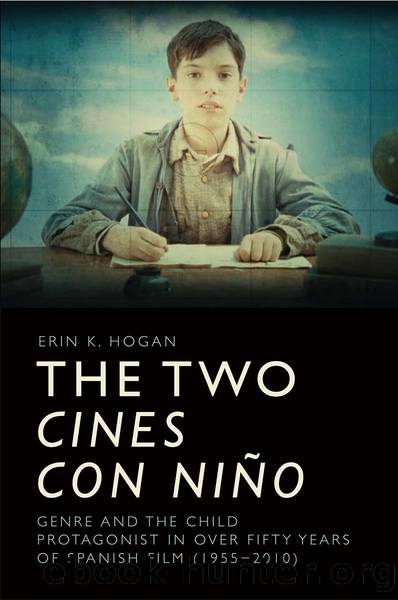The Two Cines Con Nio by Erin K. Hogan

Author:Erin K. Hogan
Language: eng
Format: epub
Publisher: Edinburgh University Press
Figure 5.1 Marcelino (Pablito Calvo) explores the attic in Marcelino pan y vino.
Figure 5.2 Javi (Andoni Erburu) explores the basement in Secretos del corazón.
The other haunted space, according to Juan, is the mansion of their TÃa MarÃaâs (Charo López) lover Ricardo (Chete Lera). However, this time, Javi reveals the secret of MarÃaâs affair with Ricardo to Juan. This man is the monsterâs equivalent in Secretos del corazón, likened to the blow-up Michelin Man his reflection replaces in a store window while Javi strolls with MarÃa. The image recalls the transition from Ana to Frankensteinâs monster in El espÃritu de la colmena. Javiâs approach to the mansion, beyond its spider web-designed metal gate, prioritises sound over sight since Javi is unable to get a clear view of its interior. The camera shows a close-up on Javiâs friend Carlosâs (Ãñigo Garcés) ear as he confuses the sounds of the house with hauntings. Again, a jarring noise, that of a train barrelling by, alarms the boys and interrupts their snooping. The Gothic train indicates, as Georgieva notes, mystery, horror, and a desire to uncover past secrets (2013: 168). Javi reveals the âsecrets of the heartâ here as well, when he spies on MarÃa and Ricardo and discovers a heart in an ornament at the front door. The âmonsterâ Ricardo is no one to fear. Those tagged as monstrous (the maqui or Ricardo) simply do not comply with the moral standards of Francoism. Ricardoâs monstrosity stems from his extramarital affair with MarÃa.
Javiâs prosopopeia reveals the secrets of the past and present, although the film demonstrates ambivalence regarding righting past wrongs.2 His approach to his âfatherâsâ armchair allows him to expose an infidelity and his investigation at the âuninhabited houseâ permits the revelation of another. These transgressions are accepted and not judged by the film, although the union of their expectant mother to their âuncleâ is sanctified by the Church in the end. Perhaps by accepting the actions of his mother and âuncleâ, Javi does not fall prey to the same repressive thinking of his TÃa Rosa (Vicky Peña), the Francoist moral arbiter of the family. I would argue that Javi does not ultimately follow his motherâs advice to keep quiet about his fears and discoveries. In fact, his coming-of-age largely rests on his disobedience to authority figures and overcoming his fears. Javi lies to the priest director of his Salesian school play (Armendáriz also attended a Salesian school in Pamplona (Gómez 1998: 83)) in order to make possible Juanâs return from expulsion to reclaim his starring role. Rob Stone contrasts Secretos to other films of the cines con niño on this subject: âJaviâs eventual crossing of the river, his triumphant breaking of the cobweb, are signs that his new generation would beat its irrational fears and soon substitute a progressive, liberal Spain for the terror of an annihilation that never happenedâ (2002: 103). Overcoming the fear of ghosts is central to our next film for discussion, El espinazo del diablo.
El espinazo del diablo (Del
Download
This site does not store any files on its server. We only index and link to content provided by other sites. Please contact the content providers to delete copyright contents if any and email us, we'll remove relevant links or contents immediately.
Kathy Andrews Collection by Kathy Andrews(11809)
The remains of the day by Kazuo Ishiguro(8967)
Paper Towns by Green John(5174)
Spare by Prince Harry The Duke of Sussex(5173)
The Body: A Guide for Occupants by Bill Bryson(5075)
Industrial Automation from Scratch: A hands-on guide to using sensors, actuators, PLCs, HMIs, and SCADA to automate industrial processes by Olushola Akande(5044)
Machine Learning at Scale with H2O by Gregory Keys | David Whiting(4290)
Be in a Treehouse by Pete Nelson(4031)
Never by Ken Follett(3931)
Harry Potter and the Goblet Of Fire by J.K. Rowling(3842)
Goodbye Paradise(3797)
The Remains of the Day by Kazuo Ishiguro(3388)
Into Thin Air by Jon Krakauer(3384)
Fairy Tale by Stephen King(3366)
The Cellar by Natasha Preston(3332)
The Genius of Japanese Carpentry by Azby Brown(3283)
120 Days of Sodom by Marquis de Sade(3256)
Reminders of Him: A Novel by Colleen Hoover(3074)
Drawing Shortcuts: Developing Quick Drawing Skills Using Today's Technology by Leggitt Jim(3069)
